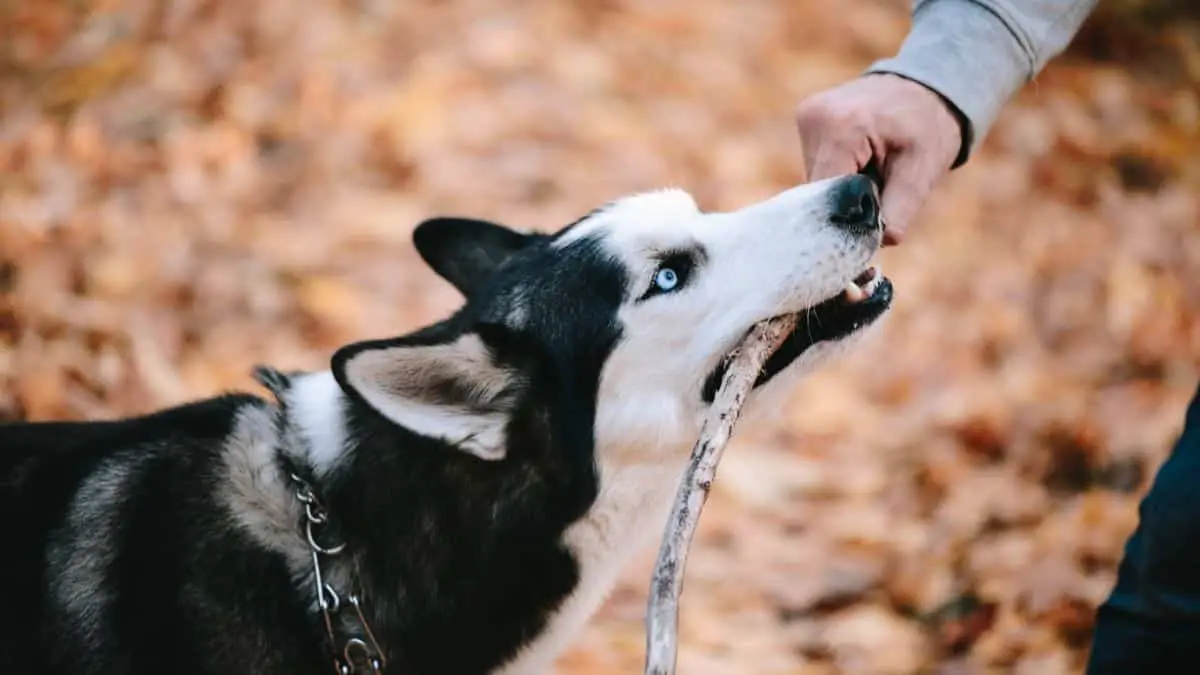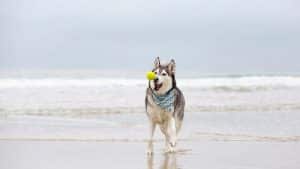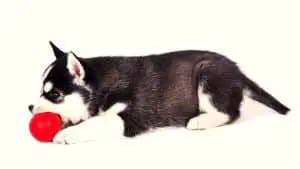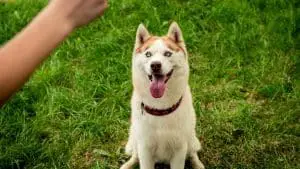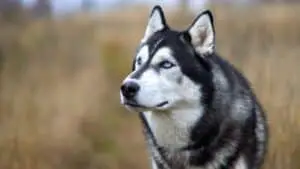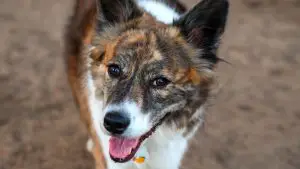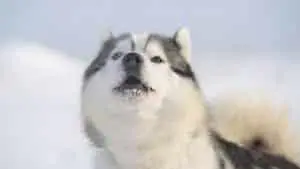How To Stop Siberian Husky’s Biting? You Might Be Surprised
While many Husky owners expect the odd nip or nibble throughout the course of their Husky’s life, no owner wants this to become a serious and problematic habit. The bite of an adult Husky can be quite painful and can be a sign of a wider aggression problem. The good news is that this behavior can be trained out of your Husky, no matter their age.
The tendency to bite in Siberian Huskies comes as a natural instinct and will emerge even when your Husky is still just a puppy. Despite this, the habit of excessive biting can be controlled and managed if the proper training and coaching are provided. It is best to begin this training at a young age, to better help your Husky develop good habits later on.
In puppies, biting is a way of exploring and learning their surroundings. It is not a behavior that should be encouraged, or even ignored, however. In adult dogs, a habit of biting can not only become a danger, but it can also be very stressful and troublesome for you, the owner.
Table of Contents
Why Your Siberian Husky is Biting
There are many reasons why a Siberian Husky would bite. In some cases, biting is a way for your dog to assert his position. If this is the case, you may notice other domineering or aggressive tendencies emerging in your Husky, along with the biting. By biting, your Husky is trying to show you who is in charge.
As with many other aspects of puppy training, you may want to correct any biting habits that your Husky pup is displaying while they are still young. This is the best time for behavior correction as your puppy is still in his formative years and will take in instructions easily.
Siberian Huskies are also likely to bite when they feel that they are in danger. Hopefully, this is not a common scenario with your Husky! If your Husky has been properly socialized and lives in an affectionate and loving home, they will never feel so under threat as to need to bite.
It is also common for dogs, not just Huskies, to bite when they are bored. This is both a way for them to let off some steam and excess pent-up energy, as well as to get some attention.
At first, when your Siberian Husky is still just a puppy with baby teeth, biting can seem somewhat harmless and you might be inclined to even think of it as playful. But, as your dog grows older this formerly charming habit will become potentially dangerous, not only to you and your family but other people and animals too. As such, you should not tolerate biting, no matter how innocent and playful it seems.
How To Stop the Biting
Whenever your puppy bites the best thing you can do is to say a firm ‘NO’ followed by the puppy’s name. You must also seem sad. Do this every time he bites, even when it is just a nibble. Just as with any other aspect of training your puppy – whether you are teaching him to sit or stop biting – consistency is key for a successful outcome.
With time, your Husky will learn that biting hurts you and makes you sad and he will stop this behavior. When your Siberian Husky bites while playing, issue the ‘NO’ command, stop playing with him, and ignore him for some time. Do not play games that involve wrestling, a tug of war, or other games that involve domination. If you don’t have your Husky’s biting tendencies under control, these games may trigger more aggressive Siberian Husky biting and will prove a tough habit to break.
If you notice your Siberian Husky has started biting, ensure you take action immediately, regardless of the dog’s age. Do not excuse the behavior simply because the dog is young and you think the nibbling is cute. This same cute puppy may end up biting like a monster as an adult dog if not stopped.
When your Siberian Husky is older, it may be best to seek professional help to aid you in putting a stop to any problematic biting. Most adult dogs with a biting problem most likely had some unresolved issues when they were younger. If you have adopted or fostered an adult dog, you are more likely to encounter this problem.
While it can be harder to eliminate bad behaviors in adult dogs, it is certainly not an impossible task. Do your research on a reputable dog trainer in your area, particularly one who is experienced in training adult dogs. You may need to expend a little more time and effort in stopping your adult dog from biting, but doing so is a responsible and necessary endeavor for any dog owner.
When handling your Siberian Husky’s biting problem, you should never hit your Husky or use any form of physical abuse on him. Such actions may actually be counterintuitive and could trigger an aggressive response in your Husky, potentially even leading to an attack. Positive reinforcement – or rewarding good behavior – is key to the long term success of any training of your Husky.
Frequently Asked Questions
Do Huskies bite their owners?
Huskies, originally bred as working sled dogs, also have a natural instinct for hunting and a strong prey drive. Biting is a normal part of this instinctive behavior, and you may even start to notice it in your Husky pup when he nips at you during playtime.
Although this is a natural instinct, it is possible to teach your young Husky not to nip and bite – after all, those little Husky pup bites will soon become a lot more serious (and painful!) once his adult teeth grow in.
Just as with any other breed, a well-behaved adult dog should not bite his owners. Instilling this good behavior in your puppy from a young age makes it much more likely that your adult Husky will display these good behaviors later on in life.
At what age do Huskies stop biting?
Puppy biting is a fairly common phenomenon among all breeds of dogs. As puppies start to grow their adult teeth and lose their deciduous teeth, they will often bite, chew, and gnaw at things in a bid to relieve some of their discomfort and pain.
Teething usually starts at around 3 months of age and can continue until your Husky pup reaches 6 months of age. It is important that you have established some rules around what is acceptable biting and chewing behavior, and what is not. The use of a good chew toy and a thorough understanding of your pup’s body language can help here!
By the time all his adult teeth have erupted, your Husky should stop trying to gnaw at everything in sight.
Why do Siberians bite themselves?
One of the most common reasons a dog – and this problem is not just limited to Huskies – will bite himself is as a result of external parasites. Fleas, ticks, and other nasties can irritate your dog’s skin, and he will often bite and scratch at himself to provide some relief from this annoyance!
Allergies, which usually manifest as just another form of skin irritation, may also be causing your Husky to bite himself. If you suspect your Husky has an allergy, whether to his food or another environmental factor, make sure you take him to a vet.
Compulsive behavior that is borne out of boredom or separation anxiety might also cause your Husky to bite at himself. If this is the case, you will need to either exercise and stimulate your dog more regularly, or you will need to take steps to help reduce his separation anxiety.
Is biting a sign of aggression in dogs?
In many situations and circumstances, your Husky’s biting and chewing is a fairly normal habit. One of the primary ways that dogs can explore their surroundings is via their mouths, and oftentimes the odd nip or bite is simply borne out of curiosity and the desire to explore something new.
When this behavior becomes a cause for concern is when it is accompanied by other acts of aggression. This might be growling, overprotectiveness around food, unsociable behavior around other dogs and people – in short, a complete absence of happy body language!
If this is the case, you will need to take immediate action and enroll your adult dog in the proper training classes. Aggressive dogs often need the intervention and assistance of a professional trainer, and if you think that your Husky might present a risk of an aggressive dog attack or could be a danger to children or small animals, this is your best step forward.
When should I be worried about my Husky’s biting habits?
If you are coming home to bite marks in your furniture and your favorite shoes look like they’ve been through a shredder, then you may need to take some quick and firm action to nip your Husky’s biting behaviors in the bud.
Although it is normal for puppies to bite while they are teething, you shouldn’t have to sacrifice your furniture. Try investing in a proper chew toy or a Kong, and encourage your puppy to turn his toothy attention here, rather than to your trainers.
If you think your dog is suffering from boredom or separation anxiety and that is leading to his need to bite everything in sight, you will need to make sure you are exercising him enough. Your Husky is great at finding an outlet for his energy in any way he can, so stay one step ahead of him and take him for regular, long walks. Pounding the pavement with your pup might just save your couch from destruction!
Is there special training to stop dogs from biting?
Most puppy obedience classes will teach your Husky pup a wide range of good behaviors, including how to stop them from biting, nipping, and chewing. Taking your young Husky to a puppy training class can help set the correct foundations for managing this instinctive inclination.
If you have an older Husky that has not been given the proper training and does not respond to your commands, getting some professional training can also be of use. Biters have a poor reputation among the adult dog world, and this is not a habit you want your beloved Husky to get into!
What is a good chew toy to stop my dog from biting?
The type of chew toy you provide for your Husky will really depend on your individual dog’s taste and preferences. It is advisable to have both soft and hard chew toys on hard, especially when your pup is going through the teething stage.
A toy such as a Kong can also help in stopping destructive biting when you are away from home, as it has the dual benefit of being a chew toy and providing your dog with an activity to keep him busy – getting himself his favorite treats or kibble!

